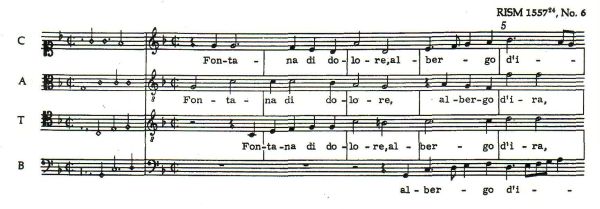The music of Cipriano De Rore
Fontana di dolore
A. Type:
Madrigaal
B. Number of voices:
4vv
C. Author of the text:
Petrarca, Francesco
Ct. Text:
(with translation in Dutch English)
: Read
E. To be found in the following score sources:
following: CMME Project(The) - Dumitrescu (e.a.), Theodor :
-
{Census} - ParisBNC 851 ("Bourdeney Manuscript")
: '{Census} - ParisBNC 851 ("Bourdeney Manuscript")'
following: Lewis, Mary S. (1997) :
-
1557 :
{Lewis_2} - 231
: 'RORE. II° LIBRO DE MADREGALI A 4'
following: Meier, Bernardus (1969) :
-
1557 :
{RISM} - 1557_24
: 'Di Cipriano de Rore il secondo libro de madregali a quatro voci con una canzon di Gianneto sopra di Pace non trovo con quatordeci stance novamente per Antonio Gardano stampato e dato in luce.'
following: Vogel, Emil (1892 (2de uitg., 1977)) :
-
1569 :
{Vogel} - 52
: '(1569) CANTO | DI CIPRIANO DE RORE IL SECONDO LIBRO DE' MADRIGALI A QVATTRO VOCI | CON VNA CANZON DI GIANNETTO (!) | Di Quatordeci Stanze Sopra di Pace non trouo, | NVOVAMENTE CON OGNI | DILIGENTIA RISTAM-PATO. | LIBRO (Drz) SECONDO | IN VENETIA, Appresso Claudio da Correggio. | MDLXVIIII.'
-
1571 :
{Vogel} - 53
: '(1571) CANTO | DI CIPRIANO DE RORE | IL SECONDO LIBRO DE MADRIGALI | A Quatro Voci, Con vna Canzon di Gianetto; sopra di Pace non trouo, Con | quatordeci stanze. Noua-mente con ogni dilligentia Ristampato. | A QVATRO (Drz) VOCI | CON GRATIA ET PRIVILEGIO | di Antonio Gardano. | 1571.'
-
1577 :
{Vogel} - 51
: '(1577) TENOR | DI CIPRIANO DE RORE | IL SECONDO LIBRO DE MADREGALI | a quatro voci Con vna Canzon di Gianneto (!) sopra di Pace non trouo Con quatordeci | stanze Noua-mente per Antonio Gardano stampato et dato in luce. | CON GRATIA ET PRIVILEGIO | A QVATRO (Drz) VOCI | In Venetia Appresso di | Antonio Gardano. | 1557.'
-
1577 :
{Vogel} - 54
: '(1577) TVTTI I MADRIGALI | DI CIPRIANO DI RORE | A QVATTRO VOCI, | SPARTITI ET ACCOMMODATI PER | sonar d'ogni sorte d'Instrumento perfetto, & per Qualunque studioso di Contrapunti (!). | Nouamente posti alle stampe. | (Drz) | In Venetia Apresso di Angelo Gardano. | 1577.'
F. Modern score:
See 'Meier, Bernardus : Cipriani Rore Opera Omnia, Vol IV : Madrigali 3-8 vocum' : p.70
I. Incipit:
 Source:
'Meier, Bernardus : Cipriani Rore Opera Omnia', American Institute of Musicology
Source:
'Meier, Bernardus : Cipriani Rore Opera Omnia', American Institute of Musicology
L. References:
References with citation/remark:
1 : Cambier, Albert,
Meer gegevens over de ronse komponist Cypriaan De Rore.
(, Ronse, 1982)
in : Annalen van de Geschied- en Oudheidkundige Kring van Ronse en het Tenement van Inde, XXXI (1982), p. 91-95
- p.93
: 'Dat De Rore niet kritiekloos stond tegenover het zedelijk verval van het pausdom in zijn dagen, wordt ons bewezen door zijn muzikale bewerking van een gedicht van Petrarca 'Fontana di dolore' dat in scherpe bewoordingen het toenmalig verval van Avignon hekelt.'
2 : Einstein, Alfred,
The Italian Madrigal (vertaald naar het Engels door Alexander H. Krappe, Roger H. Sessions en Oliver Strunk)
(Princeton University Press, New Jersey, 1949)
- p.392-393
: 'Strangely enough, Rore is the composer of two splendid political madrigals, not for five voices but for four, both in his second book. The first of these, which opens the print, has to do with the rebellion against Charles V of the German Protestant princes allied with France (l'aureo giglio) and announces to the emperor, in pro-phetic and flaming words, his certain victory: 'Un'altra volta la Germania strida'. This composition can only have been written in 1543 or 1544, since toward the end of 1543 the war between Francis I and Charles V in northern Italy broke out afresh; or in 1546 or 1547, when hostilities began between Charles V and the Lutheran princes of the League of Schmalkalden. Thus in those days the madrigal could become a vehicle for political, if not for nationalistic, enthusiasm. But it is still stranger that Rore should have set that sonnet of Petrarch's: 'Fontana di dolore, albergo d'ira' in which the gentle singer of Madonna Laura heaps abuse upon papal Rome as the home of all the vices and deceit, as a shameless harlot. How was this possible in the days of the Council of Trent? How was it possible to publish this madrigal, which could be interpreted only in a very actual sense? What powerful patron and protector was shielding Rore? Was it the Duke, who foresaw the future sufferings of his state under papal rule ? The composition could have been written only in Ferrara, and it was naturally put on the Index.'
References without citation:
3 : Meier, Bernardus,
Cipriani Rore Opera Omnia, Vol IV : Madrigali 3-8 vocum
(American Institute of Musicology (AIM), 1969)
- p.VIII
4 : Swigchem, Lineke (Van),
Io canterei d'amor si novamente: de madrigalen van Cipriano De Rore
(, Doctoraalscriptie, Universiteit van Amsterdam, 1993)
- p.169
Page last updated :
30/06/2022 20:08:46
My code :
#5765 (M_4_70)